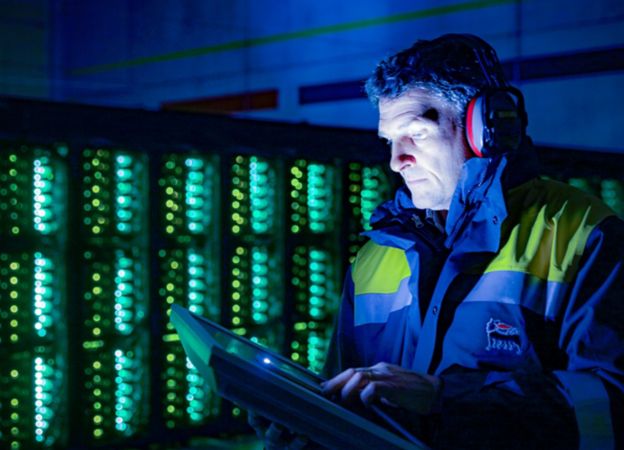>15 mln
ton/y
(million tons per year) transport and storage capacity by 2030¹

Or , our new artificial intelligence tool.
Our projects for the capture, transportation, storage and reuse of CO₂ (CCUS), a set of technologies that are indispensable for lowering emissions.
The technological chain of capture, transport, storage and utilisation of CO₂, (CCUS) allows carbon dioxide emissions to be captured directly from the industrial plants that generate them.
Capture and storage of CO₂ (CCS) are currently available and effective solutions for decarbonising hard-to-abate sectors, i.e. industries where, due to both high energy consumption and the nature of their production cycles, there are currently no equally effective technological alternatives (e.g. steel, cement, paper and chemical industries).
The importance of the CCUS for the energy transition is emphasised by major international organisations, such as the International Energy Agency (IEA), the International Panel on Climate Change (IPCC), the International Renewable Energy Agency (IRENA) and the United Nations. Also at the international level, these projects are supported by the European Union as part of the EU Industrial Carbon Management Strategy1, as well as by the United Kingdom and the United States of America. This is why we have made it an element of our decarbonization pathway, pursuing CCS projects and supporting research in CCU.
For Eni, CCS is a key lever for the energy transition, both for the decarbonization of its own operations and for third-party industries. With the projects we have already launched in Italy and the United Kingdom, we have secured a leadership position in the sector, while we are planning to develop further initiatives in North Africa, the Netherlands, and the North Sea. Furthermore, in 2025, we launched the satellite company CCUS Holding which - by finalising the agreement with Global Infrastructure Partners (GIP) - strengthens the application of our satellite model.
Eni's approach to CCUS also includes monitoring, before, during, and after the injection of CO2 into the reservoir. These activities, carried out through sensor networks and the use of robotic systems, cover the surface, subsurface and offshore environment.
In 2023 we started the international research project HERCCULES, which is supported by us and other partners and coordinated by the Energy and Environment Laboratory Piacenza (LEAP). The initiative is financed as part of the Horizon Europe framework programme with European funds amounting to approximately thirty million euros. The aim of the project is to develop innovative CO2 capture technologies for the cement and waste-to-energy sectors by setting up demonstration plants in two cement plants and one waste-to-energy plant located in Northern Italy and in Greece.
Carbon Capture and Storage (CCS) is an important tool to support hard-to-abate industries in reducing their emissions. Here are some numbers that testify to our commitment.
(million tons per year) transport and storage capacity by 2030¹
(million tons per year) transport and storage capacity after 2030¹
gross storage capacity
With the launch of the Ravenna CCS project on the Ravenna coast and the development of HyNet North West in Liverpool Bay, we are conducting our Carbon Capture and Storage (CCS) activities, establishing ourselves as industry leaders.
Ravenna CCS is the first project in Italy for the capture, transport and permanent storage of CO2, developed through a Joint Venture between Eni and Snam. Phase 1, which began in September 2024, aims to capture, transport, and store 25,000 tonnes of CO2 per year from the emissions of Eni’s natural gas processing plant in Casalborsetti. In 2026 the Ravenna CCS – Phase 1 project was awarded the IPTC Sustainability Excellence Award, officially gaining international recognition for its technological maturity and operational reliability. With Phase 2, scheduled to start before 2030, storage capacity will progressively increase, and Ravenna CCS could become the main CCS hub for Southern Europe and the Mediterranean.
HyNet North West, located in Liverpool Bay, is one of the UK’s flagship CCS projects and is actively supported by the UK Government for its contribution to reducing hard-to-abate emissions, in line with the country’s goal of storing 20-30 million tonnes of CO2. Its objective is to transform one of the country’s most energy-intensive industrial regions into one of the world’s first low-carbon industrial clusters. The first storage activities are expected to begin in the second half of this decade, with progressive increases from 2030 onwards.
With the launch of the Ravenna CCS project on the Ravenna coast and the development of HyNet North West in Liverpool Bay, we are conducting our Carbon Capture and Storage (CCS) activities, establishing ourselves as industry leaders.
Ravenna CCS is the first project in Italy for the capture, transport and permanent storage of CO2, developed through a Joint Venture between Eni and Snam. Phase 1, which began in September 2024, aims to capture, transport, and store 25,000 tonnes of CO2 per year from the emissions of Eni’s natural gas processing plant in Casalborsetti. In 2026 the Ravenna CCS – Phase 1 project was awarded the IPTC Sustainability Excellence Award, officially gaining international recognition for its technological maturity and operational reliability. With Phase 2, scheduled to start before 2030, storage capacity will progressively increase, and Ravenna CCS could become the main CCS hub for Southern Europe and the Mediterranean.
HyNet North West, located in Liverpool Bay, is one of the UK’s flagship CCS projects and is actively supported by the UK Government for its contribution to reducing hard-to-abate emissions, in line with the country’s goal of storing 20-30 million tonnes of CO2. Its objective is to transform one of the country’s most energy-intensive industrial regions into one of the world’s first low-carbon industrial clusters. The first storage activities are expected to begin in the second half of this decade, with progressive increases from 2030 onwards.
We support research and innovation across the entire supply chain of CO2 capture, storage and utilisation. Regarding the possibility of utilisation (CCU), in particular, we are working on a mineralisation technology that allows carbon dioxide to be 'recycled' in the production of Supplementary Cementitious Material (SCM) suitable for the formulation of Portland-type cements, with a high standard for use in the construction industry. The reaction at the base of the process, which involves the combination of CO2 with minerals containing silicates, occurs spontaneously in nature but over geological timescales. Eni's innovation consists in having developed a technology that accelerates the reaction to a few hours and gives the product properties that make it suitable for the formulation of cements.

If you want to change topic, clear the chat and make a new query to receive more relevant results.
This will delete the question history.
If you want to change topic, clear the chat and make a new query to receive more relevant results. This will delete the question history.
Here you can find the full list of your queries.
The answers are generated by artificial intelligence, therefore they may contain inaccuracies. Please read the terms and conditions of use.

EnergIA is an innovative tool based on artificial intelligence capabilities, which can help you navigate the contents of eni.com, quickly finding answers to your questions. EnergIA can also perform a search on a specific topic, providing the most up-to-date data available, or it can invite you to delve deeper into a topic of your interest by suggesting links and specific readings. Start now!
EnergIA is an innovative tool based on artificial intelligence capabilities, which can help you navigate the contents of eni.com, quickly finding answers to your questions. Start now!
EnergIA (ener'dʒia) is a system based on Generative Artificial Intelligence.
Thanks to this technology, we can respond to your requests by querying the most relevant content and documents available on eni.com. (Note: financial documents from the last 12 months and press releases from the last 2 years are considered.)
Through EnergIA, you can delve into topics of interest and have a real-time window into the world of Eni.
If you wish to search for a specific document, press release or news, use the traditional search engine via the magnifying glass icon.
Like all systems that leverage Generative Artificial Intelligence, EnergIA may generate inaccurate or outdated responses. Always consult the sources that EnergIA proposes as the origin of the generated information.
If the system fails to find an exact match for the requested content, it still tends to provide a response.
If you find any inaccuracies in the provided response, please send us your feedback at the bottom of the page: it will be very helpful for us to improve.
Remember that the content generated by the system does not represent Eni’s official position. We therefore invite stakeholders to refer to their designated contacts for official statements: Press Office for journalists, Investor Relations for analysts and investors, Company Secretariat for shareholders etc..
EnergIA can understand questions posed in almost all languages, but we prefer to provide you with a response in English or Italian, the two languages available on eni.com. If you ask a question in Italian, the content on the site in Italian will be consulted. If you ask it in English or any other language, the content in English will be consulted. (Note: the language Eni uses for financial documents/content is predominantly English.)
If questions are formulated that violate the set security criteria, the system will not proceed with processing the response. Please remember not to send personal data.
By using this service, the users acknowledge that they have read and accepted the terms and conditions of use.
Search
EnergIA (ener'dʒia) is a system based on Generative Artificial Intelligence.
Thanks to this technology, we can respond to your requests by querying the most relevant content and documents available on eni.com. (Note: financial documents from the last 12 months and press releases from the last 2 years are considered.)
Through EnergIA, you can delve into topics of interest and have a real-time window into the world of Eni.
If you wish to search for a specific document, press release or news, use the traditional search engine via the magnifying glass icon.
Like all systems that leverage Generative Artificial Intelligence, EnergIA may generate inaccurate or outdated responses. Always consult the sources that EnergIA proposes as the origin of the generated information.
If the system fails to find an exact match for the requested content, it still tends to provide a response.
If you find any inaccuracies in the provided response, please send us your feedback at the bottom of the page: it will be very helpful for us to improve.
Remember that the content generated by the system does not represent Eni’s official position. We therefore invite stakeholders to refer to their designated contacts for official statements: Press Office for journalists, Investor Relations for analysts and investors, Company Secretariat for shareholders etc..
EnergIA can understand questions posed in almost all languages, but we prefer to provide you with a response in English or Italian, the two languages available on eni.com. If you ask a question in Italian, the content on the site in Italian will be consulted. If you ask it in English or any other language, the content in English will be consulted. (Note: the language Eni uses for financial documents/content is predominantly English.)
If questions are formulated that violate the set security criteria, the system will not proceed with processing the response. Please remember not to send personal data.
By using this service, the users acknowledge that they have read and accepted the terms and conditions of use.
A new window into Eni’s world, at your disposal. EnergIA is an innovative tool based on artificial intelligence capabilities, which can help you navigate the contents of eni.com, quickly finding answers to your questions.

